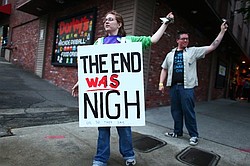Apocalypse not now
AP
Becky Friedman stands outside a rapture party on Saturday, May 21, 2011 at Dorky's Arcade in Tacoma, Wash. Groups of local atheists gathered at the arcade in Tacoma on the day that radio minister Harold Camping predicted would be the beginning of rapture. The Tacoma party featured members of the local AM radio "Ask An Atheist" talkshow.
Prediction produced a cultural moment
Associated Press
NEW YORK
Where were you on the day the world didn’t end?
Did you, like many thousands of others, turn to a social network and confess to the world something you had kept hidden? Did you laugh it off and make jokes about not having to go to work Monday? Did you pick your favorite end-times pop song and blast it on the car stereo?
Did you maybe scoff a little while wondering — just a teensy bit, in a tiny place in the very back of your head — what you might do if Saturday were indeed your final day on the planet?
Or maybe it was all of the above. Regardless, as multiple media outlets put it Sunday — in precisely the same wording — “We’re still here.”
The curious buildup happened like this: An American minister captivated believers and aroused skeptics by using math and the Bible to predict that Saturday would begin the rolling global destruction of Judgment Day.
The day ended with no discernible apocalyptic events, but the prediction produced an unusual cultural moment: a brief window where the odd and the humorous, the faithful and the commercial and the cosmic all blended into ... well, something.
Clearly something about the prediction from Family Radio International touched a nerve. And unsurprisingly so: In uncertain times — and these are most certainly those — it’s hard to avoid wondering just how bad things might get.
Less than five months old, 2011 already has brought us a cataclysmic earthquake, tsunami and nuclear crisis in Japan, another tremor in New Zealand, major tornadoes in the American heartland and, on Saturday, a volcano eruption in Iceland. Manmade events, from the uprisings in the Mideast to the killing of Osama bin Laden to the ongoing struggle of the global economy, also contribute to the sense that things are moving at a dizzying pace. And a tiny earthquake near Family Radio’s California headquarters Saturday night probably didn’t help perceptions much.
Lots of fodder for conversation. So when the hour of Harold Camping’s prediction was approaching, people — a lot of people — had something to say.
Bloggers blogged and blogged again. Newspapers editorialized about it — and some took Camping’s money and ran his advertisements, which also appeared on billboards in many countries. Cable news anchors spent big chunks of Saturday chatting about it.
As with so many curious cultural blips, from the balloon boy to the angry flight attendant, it’s easy to say that attention to this was created and fed by the media. But that doesn’t account for the social networks — for the millions on Twitter who made topics such as “rapture” and “judgmentday” trend throughout the day. And for the ones who answered the call to confess secrets and assemble Judgment Day play lists (it was a good day for Blondie’s “Rapture” and R.E.M.’s “It’s the End of the World As We Know It [And I Feel Fine].”
Yet behind the wink-nudge flavor of it all, some of the talk and even a bit of the humor felt tinged with tentativeness: Sure, it wasn’t going to happen. But — lower your voice a bit — were we all absolutely certain?
 43
43

